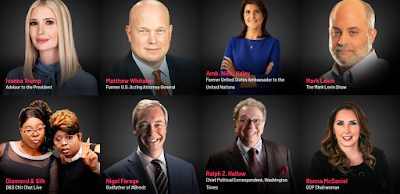National Habor, MA February 29th, 2020 (Business Insider). The Conservative Political Action Conference (CPAC), the annual DC-area gathering, once epitomized Ronald Reagan's vision of "big-tent conservatism." That meant vigorous debates among right-of-center intellectuals representing the neoconservative foreign policy hawks, socially conservative evangelical Christians, non-interventionist free market libertarians, and any other reliable Republican voting bloc.
In 2020, philosophical diversity was almost non-existent at CPAC.
Save for a panel focused on tech companies' deplatforming of certain right-of-center voices — where audience members fumed at some of the panelists' suggestions that government intervention might actually be worse than "big tech censorship" — there was almost universal agreement on the big themes of the conference.
These major themes of CPAC 2020 included:
Donald Trump is the greatest president in modern history, and the way he's been treated by Democrats and the media is unprecedented and abhorrent.
Socialism is evil, and the moderate 2020 Democratic candidates are barely less socialistic than Sen. Bernie Sanders (Vice President Mike Pence actually said "there are no moderate Democrats in this field" in his Thursday CPAC speech).

The "left" is comprised of snowflake crybabies, who are also authoritarian bullies systematically silencing conservatives and indoctrinating the younger generation through the media and culture.
In his Wednesday speech, he warned of "this culture war" which he said "is going to be the battle of our times." He added that this would be a "battle between those who believe America is good and those who believe in the notion of socialist revolution who believe we are inherently bad."
Charlie Kirk of Turning Point USA, an influential conservative youth activist group with strong ties to the White House, helped set the "small Republican" tent tenor of the proceedings. At the first mention of Mitt Romney's name, the audience booed, and Kirk responded, "Every time his name is mentioned you should react this way."
"Blexit" founder Candace Owens spent much of her Thursday speech attacking former NFL quarterback Colin Kaepernick as a "race hustler." In particular, she referenced a tweet Kaepernick sent last Thanksgiving about the U.S. government's appropriation of land from indigenous people, which she countered with a long diatribe about Aztec cannibalism and human sacrifice.
On Thursday, the main ballroom featured "FBI Lovebirds," a play starring "Lois and Clark" actor Dean Cain and "Buffy the Vampire Slayer" actress Kristy Swanson as ex-FBI employees Peter Strzok and Lisa Page. The play consisted almost entirely of the Strzok and Page's texts to each other, but was meant to demonstrate a "Deep State " conspiracy against Trump from before the time he took office.
Naomi Seibt, a 19-year-old German Youtube activist who had been invited by the Heartland Institute to speak about "climate realism" was billed as "the anti-Greta Thunberg."
Most of the CPAC attendees Insider spoke with said they feel like they're under a constant state of unfair attacks from "the left," just like President Trump.

Jeffrey Lord, a Trump supporter and former CNN contributor, told Insider, "I just think people are seriously enthusiastic about the president on top of which they're also angry at the way he's been treated."
At CPAC Central, the event's main gathering hall, vendors sold T-shirts and hats emblazoned with phrases like "Freethinkers Only," "Kiss Me I'm a Capitalist," and "This is Trump Country: Where on a Quiet Night You Can Hear a Snowflake Melting."

Elizabeth Najjar, an 18-year-old student at the Jerry Falwell-founded Liberty University, told Insider that administrators at her Virginia high school had called her parents to compel her to take down a pro-Second Amendment video she had posted to her private Facebook account. She also said she had been spat upon at her school because of her political views.
For all the complaints at CPAC about being "silenced" by "the left," there were some conservative voices who felt even more aggrieved.
At a private event Wednesday night titled "Emergency Save the First Amendment Summit" held at a hotel in Washington, DC, several "cancelled" conservatives spoke before a group of about 80 attendees. Most of the speakers had either been kicked off of major tech platforms, and some were explicitly banned from attending CPAC.
© 2020 ALL RIGTHS RESERVED
MSH WorldWide Company By Marcelo Santiago Hernández.























